
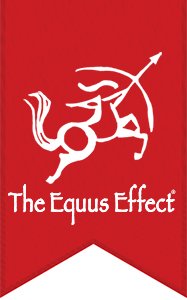
The Equus Effect
37 Drum Road
SHARON, CT 06069
Mailing Address:
37 Drum Road
SHARON, CT 06069
Phone: 203-803-9507
MAKE AN INQUIRY
View our WEBSITE
EIN: 45-2632601Founded: 2011
View our PHOTO GALLERY
Profile Last Updated January 12, 2026Public Charity

The Guardian Seal of Transparency is awarded annually to recognize an organization's commitment to transparency and accountability by their willingness to make comprehensive data about their programs, horse care practices, and governance available for public scrutiny. The Guardian Seal of Transparency is NOT an endorsement.
Last Updated: November 30, 2025
The Equus Effect has not attained the Guardian designation for 2026.

MISSION & PROGRAMS
Mission:OUR MISSION:
To provide veterans, first responders and people from all walks of life with tools to build healthy, authentic relationships through purposeful engagement with horses.
OUR VISION:
A nation where the men and women who serve our country and communities — our guardians — and those who support them have the opportunity to unwind and recover from past events and meet ongoing challenges at work and home.
In addition: All of our programs entail groundwork with horses, resilience tools derived from somatic practices and psycho-education material we call Emotional Agility. Not only is our work important to humans — but the programming with our equine partners is highly beneficial for them.
Our organization conducts Equine Assisted Services in accordance with the EQUUS Foundation Guidelines on Qualifications of Organizations Conducting Equine Assisted Services (EAS).
Our organization provides outreach and/or public education programs involving horses.
100% of our total programs and services are equine-related.
Our organization is directly responsible for the care and shelter of equines involved in our programs.
Our organization does not CURRENTLY use satellite, overflow, foster, and/or outreach facilities.
Please describe what steps your organization takes to ensure that:
1) all interactions between your equines and people are mutually beneficial and conducted in accordance with the Guidelines for Human-Equine Interactions stated below;
2) all equines in the care of our organization and/or equines that participate in the organization's program have access to clean drinking water at all times; nutritious food in sufficient quantity, including natural forage such as pasture grass and/or hay; appropriate veterinary, farrier, and dental care; shelter and protection from the weather; sufficient safe space to move around comfortably on a daily basis; and daily opportunity to freely interact and have contact with other equines:
Our priority is to keep our equines free from stress physically and mentally as we have the utmost respect for our equine partners. We never treat them as commodities and are seen as our partners in the work — collaborating with humans, who are to use finesse, never force. We have a horse-handling policy, first-aid protocol and a white board in the barn which is updated daily on any special insights on each horse.
During program, activities are conducted with care making sure that guidelines of our natural horsemanship principles are followed — always considering each horse’s temperament and their physical capabilities. Certified facilitators oversee all activities with participants and we have experienced horse-handlers (one with each horse) that are trained in our specific ways of using minimal essential pressure at all times to keep horses and humans safe. Our program is designed to allow horses choices — which in turn show how human intention is received by the horses. If a horse chooses not to cooperate, this is a reflection of the humans’ intentions. Participants are able to take these insights into how they may come across to others in their lives. Staff are there to guide transitions like this — and have the authority to remove the equine upon any sign of stress.
Our horses are able to live in a herd when turned out in their pastures. Their pasture has access to large run-in shelters, plenty of water and natural forage. There is a full-time caretaker who oversees the herd and oversees turnout, grooms daily, monitors their health and ensures that veterinary and farrier care is appropriate and adequate.
Equine Assisted Services (EAS) Overview:
Overview of our programs involved with providing EAS to individuals with special needs:
We provide Equine-Assisted Learning to veterans, military family members, first responders and others who have experienced shock or trauma in one form or another. Our program is trauma-sensitive in that we understand and respect both the external and internal manifestations of those whose nervous systems have been flooded with too much adrenaline, cortisol or pain either all at once or over a period of time. We use body-based practices along with ground-based natural horsemanship skills and didactic material to empower veterans and other adults to move beyond self-limiting patterns of thought and behavior that keep them from enjoying success and fulfillment in their lives.
We believe that healthy relationships are foundational to meaning and satisfaction in life — and our primary purpose is to give men, women and young people the tools they need to return to their lives with renewed capacity for self management, energy and presence.
We also believe that horses accelerate this process by helping participants see the ways in which unprocessed anger, depression, grief and agitation can hinder their ability to move forward in life. Gaining the trust and willingness to collaborate from a horse is not easy. We believe however, that by carefully breaking down that process through the horsemanship skills we teach and the didactic material we present, we can give clients a renewed sense of competence, confidence and optimism. They frequently report feeling that they have built the capacity to handle situations that trigger them, de-escalate situations that might have gotten out of hand and in general, bring out the best in themselves.
Trauma takes people out of the present and into fight, flight or freeze reactions to non-threatening situations. Their world is one of memories, reactivity, aggression or isolation. Trauma sufferers often put up barriers instead of healthy boundaries. They also lack the capacity to respond appropriately to others in their lives ... at home, work or school. So, while they may live with others, have jobs or go to school, trauma survivors often have a very difficult time maintaining the relationships that give meaning and purpose to life.
Horses are amazing teachers and models of what is needed for an individual to build and maintain healthy relationships. Since how they feel is what they do, their trust is transparent and their willingness to cooperate (given the choice) is based on their honest assessment of any given person or situation. As is the case with most people, horses prefer honesty, fairness, respect and finesse over force.
Also, we provide a rigorous academic training curriculum to men and women from the coaching, horsemanship and healing arts who wish to become professional facilitators of The Equus Effect Program at our location — or at their own facilities. So, The Equus Effect is both a location (Sharon, CT) and a program that is hosted by trained facilitators at other locations with horses that belong either to the individuals or to the facilities where our curriculum is delivered.
Equine Assisted Services (EAS) and Providers:
Our organization provides the following Equine Assisted Services (EAS):
Equine-assisted Learning in Personal Development
1: Total number of Equine Assisted Service Providers at The Equus Effect
1 David Sonatore, LCSW
FACILITY PARTICIPATION:
The Equus Effect
RELATIONSHIP: Other
SERVICES PROVIDED:
Equine-assisted Learning in Personal Development
DEGREES, LICENSES AND/OR CERTIFICATIONS
David is a Licensed Clinical Social Worker, an Eponaquest Equine Experiential Learning instructor, a Somatic Experiencing® advanced training graduate and a certified Martha Beck Coach.
David combines the academic and experiential training necessary to empower clients with what they need to move beyond trauma. He combines this with his keen intuition around horses and helps veterans, first responders and others in transition from one phase of ife to another realize that they can become whole again.
Outreach and/or Public Education:
As many folks know, the mental health crisis in our country is very real. We hosted a lot of people from our community during Covid and what came out of that is that we offer introduction demonstrations to clinicians who are also experiencing compassion fatigue from client overload and just from the fragmentation, polarization and general anxiety that is so prevalent in our culture right now.
We have offered community workshops for anyone to come and learn about how interactions with horses translates to compassionate and fair interactions within their relationships at home, work and school.
Research/Medical Use of Equines:
Our organization has never made, and would not ever consider making, equines available for research studies or medical training that involves invasive procedures and/or that which may cause pain or suffering to the equine.
Religious Affiliation:
Our organization does not promote religious education, religious purposes, or a specific religious faith or use donations for religious education or religious purposes; require participants to be of a certain faith; require participation in religious, instruction, activities or services; or require participation in prayer, worship, religious instruction or other religious activities as a condition of receiving social or secular services offered.
Auction Donation:
Our organization has never allowed, or would not consider allowing, an equine to be sold, transferred, released, or otherwise placed into possession of any person or organization that would cause or allow the equine to be sold at auction for slaughter.
POLICIES: INTAKE, ASSESSMENT & TRAINING
Prior to a horse being accepted and/or arriving at the facility, the organization has the following policies in place:The owner of a potential equine is interviewed over the phone or in person prior to seeing the equine
The equine is evaluated at its place of residence
The owner completes an application/contract which constitutes the agreement between the owner and our organization when the equine is acquired from the equine's owner other than by seizure or by abandonment
The owner is financially responsible for the shipping of the equine to and from the organization
If health records are not available or are out-of-date, our veterinarian will administer appropriate vaccinations
A health certificate signed by a veterinarian and dated no more than seven days prior to arrival is provided to our organization either prior to or upon arrival of the equine attesting to the health status of the equine
Trial Period: Check all that apply:
Equines are not taken on trial
Upon intake, the organization has the following quarantine policy in place:
The equine is confined to a designated and separate area for isolation and quarantine at the facility for a prescribed period of time
The equine is confined to a designated and separate area for isolation and quarantine off-site for a prescribed period of time
The equine is not quarantined
The typical length of quarantine is: Up to 10 days
Following arrival of the equine at the facility, the following is performed:
Physical examination to include temperature, pulse and respiration by a trained staff member upon arrival
A Henneke Body Conditioning Score or other body conditioning score is assigned by a trained staff member upon arrival
Photographs are taken of each equine upon arrival at the facility and kept with the equine's health records
Physical examination by a farrier
Physical examination by a dentist
Physical examination to include temperature, pulse and respiration by a veterinarian upon arrival
A Henneke Body Conditioning Score or other body conditioning score is assigned by a veterinarian upon arrival
The equine is microchipped if the equine has not been microchipped
Horses are assessed for following skills and behaviors:
Retrieval from a pasture/paddock
Leading with a halter and lead rope
Temperament, disposition and attitude, such as rated from very calm to very high spirited
Saddling
Bridling
Lunging
Loading onto and unloading off a trailer
Mounting and dismounting
Riding at the walk
Riding at the trot
Tolerance to unusual objects and loud noises
Known vices, i.e., cribbing, biting, kicking, weaving, stall walking, etc
Grooming
Bathing
Tolerance to multiple handlers at the same time
Riding at the canter
Riding by a beginner and/or unbalanced rider
Jumping
Driving (Pulling a carriage)
Clipping
Our organization has the following policies and procedures in place pertaining to the ongoing assessment of horses in its care:
Physical examination by a veterinarian at least annually
The Henneke Body Condition score or other body conditioning score is updated at least annually by a trained staff member
Vaccinations are administered at least annually
Equines at our facility may be treated by an equine chiropractor
Equines at our facility may be treated by an equine acupuncturist
Equines at our facility may be treated by an equine massage therapist
Equines at our facility may be treated by an equine nutritionist
The Henneke Body Condition score or other body conditioning score is updated at least annually by the veterinarian
Photographs are taken of each equine monthly and kept with the equine's health records
Photographs are taken of each equine annually and kept with the equine's health records
Our organization has the following policies and procedures in place pertaining to the weight-carrying or workload capabilities of horses/equines that are ridden in our care:
Our organization does not evaluate the weight-carrying and workload limitations for each equine that is ridden
Our organization evaluates the weight-carrying and workload limitations for each equine that is ridden at least annually
Our organization maintains a written record of the weight-carrying and workload limitations for each equine that is ridden
No equines are ridden; not applicable
The following variables are considered in determining the weight-carrying and workload limitations for each equine that is ridden:
Our organization does not evaluate the weight-carrying and workload limitations for each equine that is ridden
Equine age, weight, breed, body condition, fitness, balance, health and soundness
Equine conformation to include the top line, length of back, strength and width of loin, bone density (measured by the circumference of the cannon bone just below the knee)
Size, shape, condition and angle of the hooves
Participant weight, height, body proportions, balance, fitness and riding skills as well as behavioral issues and safety concerns
Weight and proper fit of the saddle and other equipment
Terrain and footing in the working environment
Duration and frequency of working sessions, as the frequency with which an equine is subjected to maximum weight carrying and/or workload
Nature and pace of work, repetitive or varied, radius of turns, degree of incline and regularity of footing when equine is subject to maximum weight-carrying capacity
Temperature and/or weather conditions
Seasonal impact on the equines' workload and weight-carrying capabilities and limitations
No equines are ridden; not applicable
Horses provided formal training (groundwork or riding): 2-3 times per week
Additional information about our intake, assessment & training policies and practices:
Since our program is based on groundwork, our primary concern is social in nature. Our horses have to be safe to work with for staff, volunteers and for the participants, most of whom are beginners.
We would hope that horses are donated with an honest assessment of their abilities and limitations. We are not averse to most, but would want to know up front what we are facing.
Were we to take in a new horse, we have two places to quarantine for 10 or more days: the open and covered round pen - depending upon the weather and the covered pen is 25' from the nearest pasture and the open round pen is at least 150' from the nearest pasture.
Also, although our program is unmounted, separate from our program, the horses are ridden for training and recreational purposes.
POLICIES: BREEDING
The organization has the following policies related to breeding and stallions:Our organization does not conduct breeding of equines owned or under the care of our organization.
The main facility where our organization conducts its programs does NOT breed equines.
One or more of the facilities where our organization conducts its programs, including foster/temporary care facilities, breeds equines
One or more of the facilities where our organization conducts its programs, including foster/temporary care facilities, are permitted to house stallions
POLICIES: EUTHANASIA
The organization has the following policies related to euthanasia:Our organization will never have an equine euthanized for space
Our organization will have an equine euthanized upon the recommendation of the veterinarian if the equine is a threat to itself, other equines, or people
Our organization will have an equine euthanized upon the recommendation of the veterinarian after all reasonable treatment options have been explored
Euthanasia is done on site when possible to decrease trauma from transport
Disposal of the carcass is handled within 24 hours
Our organization will never have an equine euthanized under any circumstances
Euthanasia is done at the veterinarian's facility
The following are authorized to administer the procedure for your organization in accordance with state laws:
Veterinarian
A certified euthanasia technician
Senior staff with appropriate training
Employee of animal control shelter or humane society with appropriate training
Veterinary student under the supervision of a licensed veterinarian
Not applicable. Our organization prohibits euthanasia under any circumstances
POLICIES: RE-HOMING
Re-homing Agreement not applicable.Our organization has the following re-homing (adoption/purchase) policies and procedures in place:
The organization does not re-home equines under any circumstances; our organization retains custody of our equines and ensures care of the equines for their lifetimes.
Our organization has the following policies and procedures related to horses that need to be retired, are no longer able to contribute to the mission of the organization, and/or are no longer manageable:
The organization does not re-home equines under any circumstances; our organization retains custody of our equines and ensures care of the equines for their lifetimes.
Equines may remain at our organization for their lifetimes
In the case an equine is unmanageable and demonstrates repeated dangerous behaviors, the equine may be euthanized upon the recommendation of the veterinarian
In the case an equine is unsound and/or unhealthy and cannot be treated to relieve suffering, the equine may be euthanized upon the recommendation of the veterinarian
The organization will accept financial responsibility for equines in the current care of the organization that need to be retired or are no longer able to contribute to the mission of the organization if all alternatives have been explored to find the equine an appropriate placement and space is not available for the equine to remain at the organization.
Equines may be found suitable homes by our organization
Equines may be returned to their owners
Equines may be sent to auction
If a suitable home cannot be located within 12 months, the equine may be euthanized
EQUINE CARE & SHELTER/FACILITY INFORMATION
Our organization does not CURRENTLY use satellite, overflow, foster, and/or outreach facilities.Total facilities at which our organization cares for and shelters horses used in our programs: 1
The Equus Effect
37 Drum Road Sharon CT 06069
Currently operational
Total number of horses/equines currently involved with your programs, under your care, and/or owned by your organization at this facility: 4
Total number of horses at this facility NOT INCLUDING those counted above: 0
Maximum capacity of horses at this facility: 5
Does your organization own, lease or use a part of this facility? Own
Provide the contact information for the individual or organization responsible for investigating abuse in the county where the facility is located, including mailing address, email address, and phone information.
Sharon Animal Control 57 Main Street Sharon, CT 860-364-0504
Does your organization conduct Equine Assisted Services (EAS) at this facility in accordance with the EQUUS Foundation Guidelines on Qualifications of Organizations Conducting Equine Assisted Services (EAS)? Yes
Total number of Equine Assisted Service Providers AT THIS FACILITY, including instructors, specialists, therapists, counselors, coaches and/or facilitators (full-time, part-time, volunteer, independent contractors, and/or providers accompanying clients) that conduct Equine Assisted Services (EAS) in accordance with the EQUUS Foundation Guidelines on Qualifications of Organizations Conducting Equine Assisted Services (EAS) AT THIS FACILITY: 1
Equine Assisted Service Providers Assigned to this Facility: (see Equine Assisted Service Provider Section below for details)
1. David Sonatore, LCSW
Timber Frame Run-In Sheds and 4 stall Barn
Veterinarian Information: The Equus Effect (*Main) Currently operational
Veterinarian: Dr. Marjorie Bruce DVM
Clinic Name: Rhinebeck Equine LLP
26 Losee Lane
Rhinebeck NY 12572
Phone: 845-876-7085
Grounds: The Equus Effect (*Main) Currently operational
Total acreage dedicated specifically to the horses: 8
Our organization has use of the following at this facility:
Structures/Barns: 1 Run-in sheds: 2
Pastures: 2 Paddocks/Pens/Turnout Areas: 1
Uncovered Outdoor Rings: 1 Covered Outdoor Rings: 1 Indoor Rings: 1
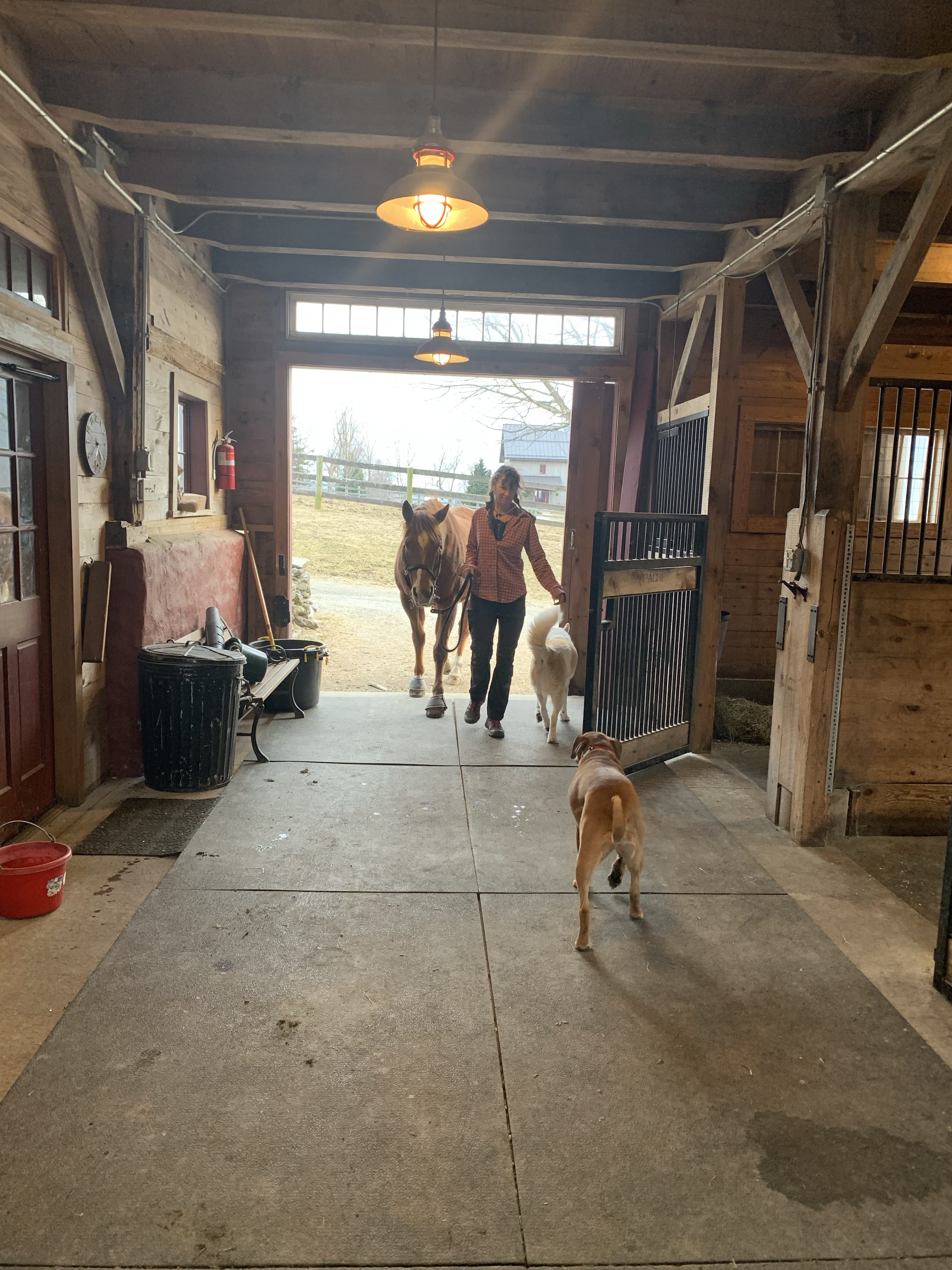
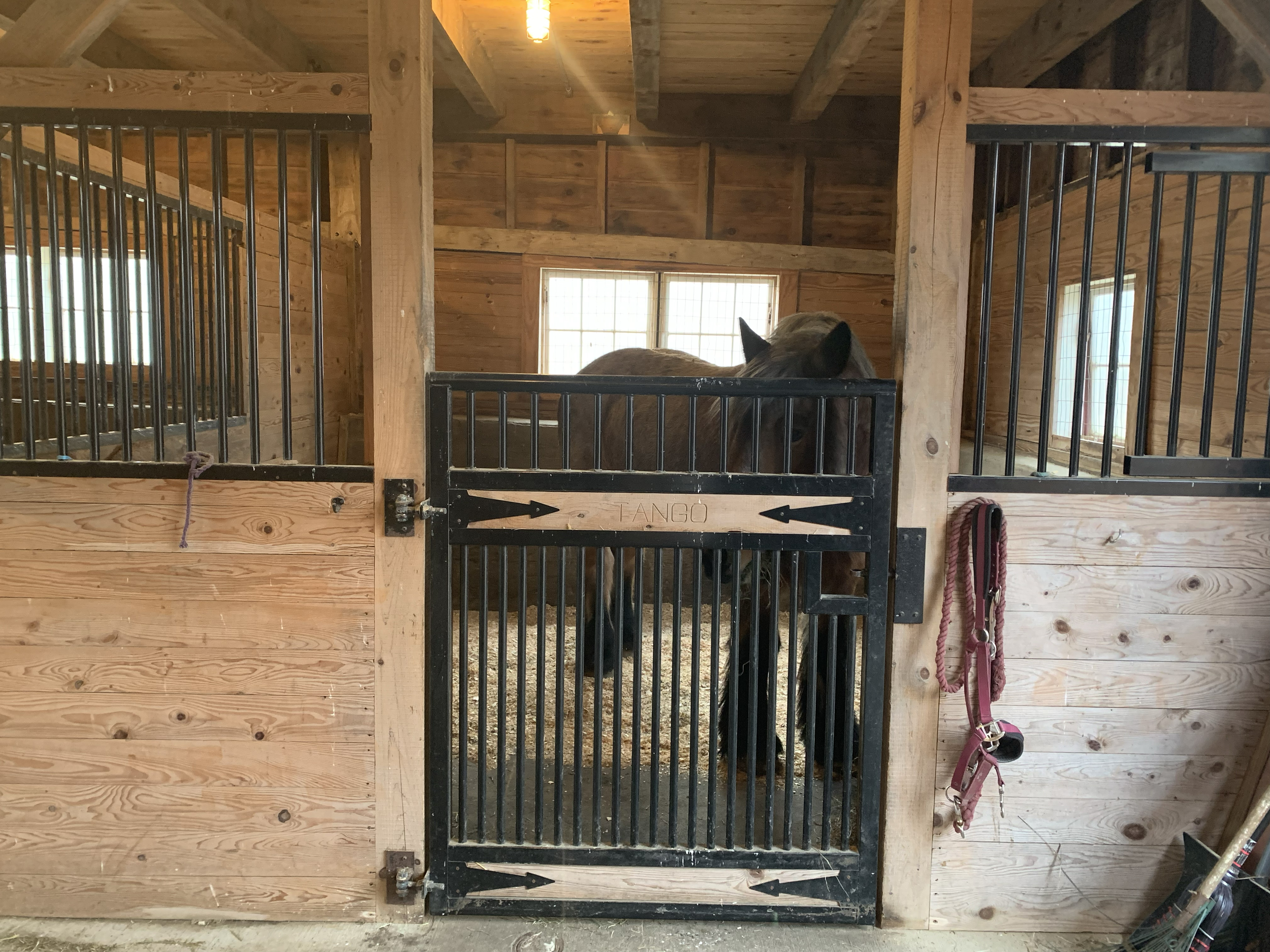
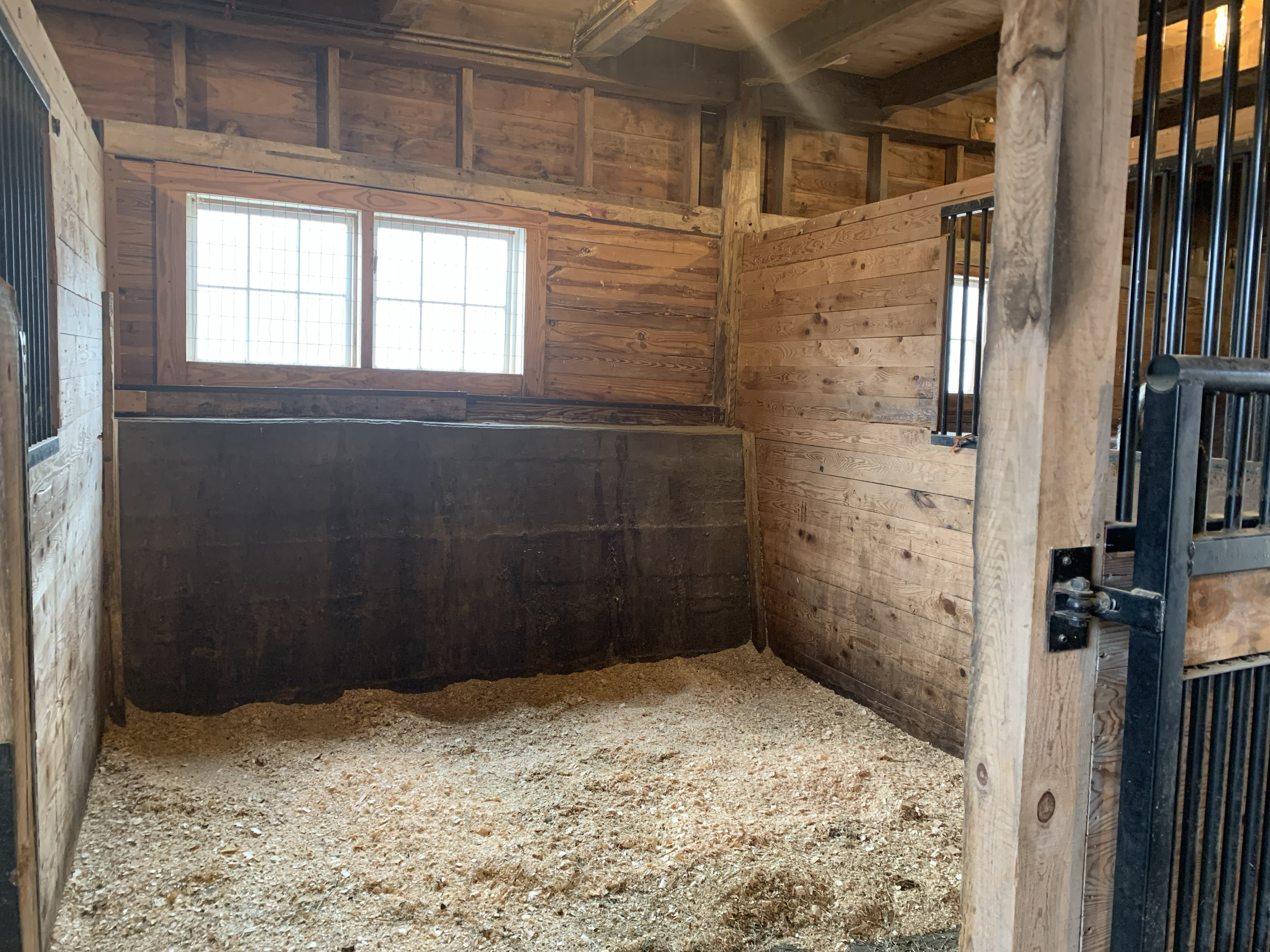

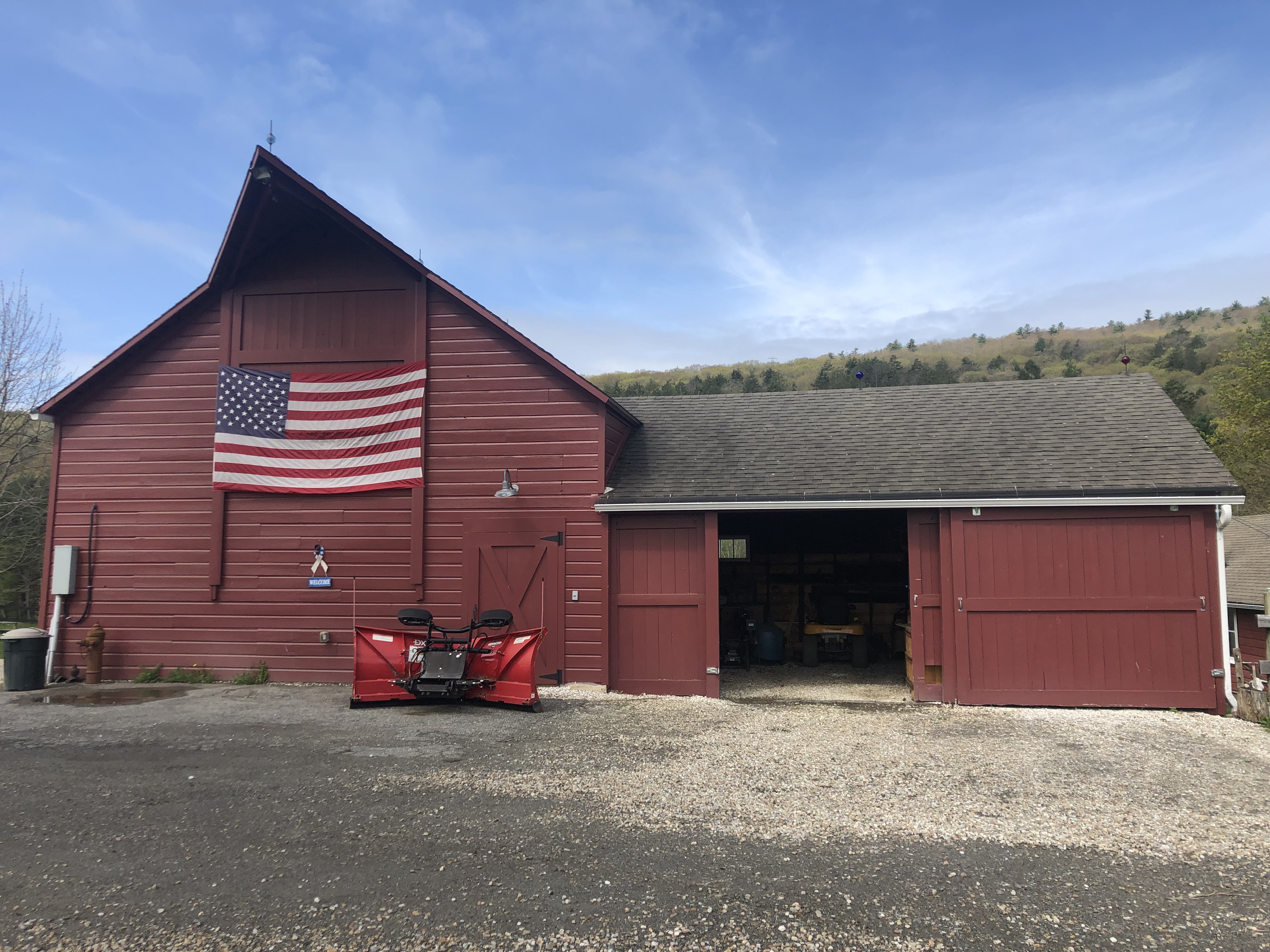

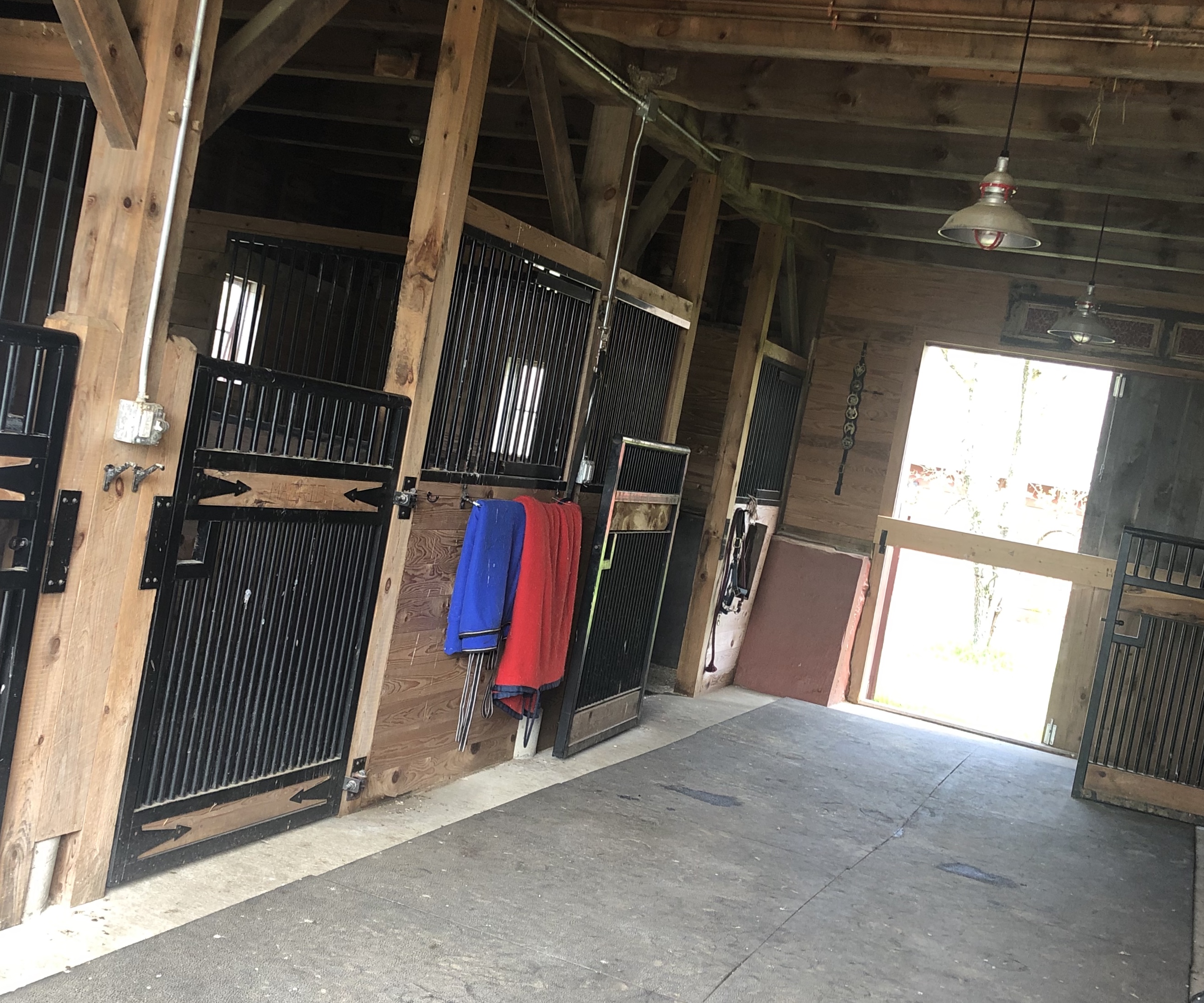

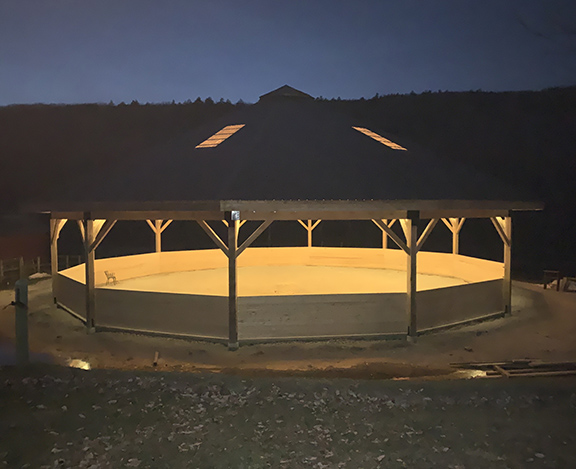
Are the organization's rules, restrictions and warnings (signage) conspicuously posted in easily accessible locations? Yes
Are the organization's emergency contacts, including veterinarian contact information, conspicuously posted in easily accessible locations? Yes
Are human and equine first aid kits easily accessible? Yes
Regarding all shelters where horses are housed including run-in sheds:
Do horses have assigned stalls in the barn/structure(s) or exclusively assigned shelter locations where they are separated from other horses with a barrier? Yes
How many hours per day, on average, are horses stalled or restricted to these sheltered exclusive shelter locations? 4-8
How often are the stalls/shelters cleaned, i.e., kept in good repair and free of standing water, accumulated waste, sharp objects and debris? 6-7 Days a Week
Do all stalls/shelters allow horses to lie down, stand up and turn around and provide protection from inclement weather (wind, sleet, rain, snow and extreme temperatures)? Yes
Are stalls/shelters kept in good repair, with adequate ceiling height, and free of standing water, accumulated waste, sharp objects and debris? Yes
Are floors constructed and maintained for both good drainage and traction? Yes
Is there a ventilation and circulation system in place to allow free flow of air to control temperature, and humidity, and to prevent air stagnation? Yes
Is wiring inaccessible to horses and maintained for safety in all areas of facility? Yes
Are fire prevention/protection measures (fire alarms, extinguishers and sprinkler systems) maintained and in good working order? Yes
Is there adequate lighting to ensure safety in all areas of facility? Yes
How many hours per day, on average, are horses turned out:
Equines are out 9 to 15 hours per day
The following describes the pastures at this facility:
A dedicated staff person(s) is responsible for pasture management
All pastures are fenced to prevent escape or injury
Fencing checks, such as broken or missing planks, loose fence posts, exposed or loose nails, detached wires, etc., are done regularly
Pastures are rotated
Pastures have man-made protection for equines (i.e., shelters)
This facility does not have pastures where equines can graze on pasture grass
This facility has a written plan in place for pasture management, which includes guidelines for seeding, fertilizing, irrigation, mowing, dragging, harrowing, manure removal, removal of debris, the control of poisonous plants, and a schedule for cleaning
Barbed wire is used for fencing
Electric fencing is used; electric wires or tape fence are visibly marked
Pastures have natural protection for equines (i.e., trees)
The following describes the turnout areas other than pastures at this facility:
This facility has a written plan in place for the maintenance of turnout areas, which includes a schedule for cleaning, manure removal, and dragging
A dedicated staff person(s) is responsible for the maintenance of turnout areas
All turnout areas are fenced to prevent escape or injury
Turnout areas have man-made protection for equines (i.e., shelters)
Fencing checks, such as broken or missing planks, loose fence posts, exposed or loose nails, detached wires, etc., are done regularly
This facility does not have turnout areas
Barbed wire is used for fencing
Electric fencing is used; electric wires or tape fence are visibly marked
The following policies and procedures are in place at the facility to restrict public access and to keep horses safe:
The property owner, staff member or caretaker lives on the premises and ensures that public access is restricted and is responsible for the security of the facility and equines
There is a mechanism in place to monitor equines overnight
By Appointment Only signs are posted.
Visitors are only permitted at specific times
Visitors are only permitted in specific areas
A security guard is present at night
No Trespassing signs are posted
Hold Harmless signs are posted
Authorized Personnel Only signs are posted
Entrance gates are locked at night
The property is fitted with motion lights
The property is fitted with a security system monitored by police or a professional service
The property is fitted with a security system that is monitored internally by staff (or the property owner)
The perimeter of the property is fully fenced
Equine Care/Emergency Preparedness: The Equus Effect (*Main) 2026 and 2025 This section is required.
Horse Health Care/Barn Management Records: What system is used to collect and store health/horse care records?
Notebook or equivalent (technology not utilized)
The organization utilizes its own system to maintain records
The following items are consistent with our feed management plan and practices:
Equines are provided with individualized feeding plans, including supplements, according to the equine's age, breed/type, condition, size, work level and any health issues, consisting of nutritious food provided in sufficient quantity and access to adequate natural forage, or be fed daily, or as recommended by the organization's veterinarian
Feed plans are determined in consultation with a veterinarian
Supplement plans are determined in consultation with a veterinarian
Equines are fed grain in individual stalls
Staff and/or volunteers are trained in proper feed measurements and protocols and observed periodically to ensure they are feeding correctly
The feed chart is centrally located and updated as needed
The area(s) where hay, feed, grain, and supplements are stored are kept clean, free of debris and chemicals, and protected from weather and other animals in rodent-proof and mold-proof containers and grain bins
Feed, supplements and hay types are clearly labeled
Water sources, i.e., buckets, troughs, automatic waterers, etc. are kept clean, free of contaminants, debris and chemicals, protected from weather and other animals, and be positioned or affixed to minimize spillage.
Medications are kept in a secure area
Equines are fed grain in groups
Is clean, potable water available at all times for all equines? Yes
Hoof Care: How often is hoof care provided for each equine? Every 4-8 weeks and when an issue arises
Dental Care: How often is dental care provided for each equine? Annually and when an issue arises
Horse checks: How often are equines visually and physically checked by personnel at the facility? Every day or 6 days a week
Our organization has the following parasite and fly/insect control protocols in place, including remedies used to control flies and insects:
Our organization follows the parasite control guidelines of our veterinarian, including fecal testing and de-worming
Fly/Insect Control Remedies:
Fly parasites
Fly Traps and Tapes
Fly Spray Repellent
Fly Masks
Fans
The following represent the biosecurity practices in place at facility:
Our organization follows the biosecurity guidelines of our veterinarian
Sick, affected and/or quarantined equines do not have contact with other equines or other animals
The organization has a written biosecurity plan
Staff are trained in best practices related to biosecurity
Volunteers are trained in best practices related to biosecurity
A specific individual is trained and assigned to care for sick, affected and/or quarantined equines
Sick, affected and/or quarantined equines are cared for last if the caretaker must also care for healthy equines
Restricted access signs are posted at primary points of access to sick, affected and/or quarantined equines
Hand sanitizers are available at all primary points of access to sick, affected and/or quarantined equines
Footbaths are available at all primary points of access to sick, affected and/or quarantined equines
Manure and bedding from sick, affected and/or quarantined equines is removed from the facility - not put in open air piles, and not spread on pastures
Quarantine areas, such as stalls, aisle ways, paddocks, and common areas, are cleaned (and needed, disinfected) after conclusion of the quarantine.
Trailers/vans used by sick, affected and/or quarantined equines are cleaned and disinfected after each use and cleaning takes place away from where equines are sheltered
Equipment used by sick, affected and/or quarantined equines is not shared
Equipment used by sick, affected and/or quarantined equines is cleaned of organic debris and disinfected after each use
Latex gloves, or equivalent gloves, are worn when working with sick, affected and/or quarantined equines
Equines are not quarantined on arrival.
The following represent the manure removal practices in place at facility:
Manure piles are composted or spread on pastures
Our organization adheres to the manure management guidelines set by the state, local authorities, and/or our organization's veterinarian
Manure is stored in dumpster(s)
Manure is piled in an area where equines are not located
Manure piles are covered
Manure is hauled, sold or given away
The following steps are taken to help staff and volunteers readily identify each horse on the property:
Equines are assigned the same exclusive stall/shelter location each day
Name plates are located on the stall/shelter location
Staff/volunteers are provided training on conformation, markings, colors, and breeds
Team leaders work with new staff/volunteers until they are able to identify the equines
Photos are located on the stall/shelter location
Equines wear halters with nametags
A notebook or binder with photos and information on each equine is easily accessible
A map/diagram is posted showing the location of each equine with equine names and photos
Equine photos and profiles are available on the website
Staff and volunteers are provided with an information packet with equine profiles, including photos and detailed descriptions
Our organization has the following policies and procedures in place pertaining to tack, apparel and equipment:
Blankets are shared
Sheets are shared
Turnout apparel is shared
Blankets, sheets and turn out apparel are fitted and utilized for each equine appropriate to the equine's needs and the weather conditions
Blankets, sheets and turn out apparel are cleaned regularly as needed
No equines are ridden; saddles, bridles, etc. not applicable.
All equines have specifically assigned apparel, equipment and tack (saddles/bridles if ridden) that is not shared
Saddles are shared
Saddle pads are shared
Bridles are shared
Bits are shared
Halters are shared
Riding Tack is always cleaned after each use
Riding Tack is always cleaned at least weekly
Riding Tack is cleaned only when needed
Riding Tack is inspected for overall working condition before each use by trained personnel
Riding Tack is assessed for fit before each use by trained personnel
Riding Tack is assessed for fit by trained personnel when an equine's body condition changes
Riding Tack is assessed for fit by trained personnel when an equine's disposition changes
This facility enlists the services of a professional saddle fitter at least once a year
Assigned riding tack is clearly labeled
Riding Tack is stored in a climate-controlled location
Helmets are shared
Helmets are cleaned/disinfected after each use
Helmets are replaced after a fall
Helmets are replaced at least every five years.
Emergency Preparedness: The Equus Effect: *Main This section is required.
The following plans, policies, and procedures are in place at the facility to handle emergencies and address weather related issues, fire safety procedures, and/or any additional hazardous scenarios the facility could potentially experience:
Emergency procedures are posted prominently
The facility owns or has access to a generator
The facility maintains at least two weeks of hay, feed, shavings and medications
The facility maintains appropriate liability and/or workers' compensation insurance
The organization has a written emergency preparedness/safety plan (EPP)
The facility collects and maintains medical information from staff, volunteers, and clients
Local fire department and/or the state's emergency planning department procedures
Medical emergencies for clients, staff, and volunteers
Medical emergencies for equines
Protocols to notify emergency personnel
Building/facility exit plans
Evacuation plans
Power outages
Fire
Natural Disasters - thunderstorm, hurricanes, earthquakes, tornados, etc
Terrorist attacks
The facility follows the specific procedures to help PREVENT emergency situations:
Smoking is strictly prohibited
NO SMOKING signs are posted prominently
Hay is stored away from permanent or temporary structures where equines are stalled
Permanent or temporary structures where equines are stalled are kept free of dust, cobwebs, trash, cleaning rags, and other flammable items
Aisles and doorways are kept clear
Heaters with automatic shutoff settings are used
How often are the following checked or performed?
Fire Extinguishers are checked: Monthly
Smoke detectors are checked: Annually
Fence lines are checked: Weekly
Turnout Areas are checked: Weekly
Sprinkler systems are checked: Not at all/NA
Fire drills are conducted: Not at all/NA
Review of safety protocols with staff are conducted: Semi-annually
Review of safety protocols with volunteers are conducted: Quarterly
The Emergency Preparedness Plan is reviewed and updated: Annually
Equine Transportation: 3= Onsite: 0 (0 + 0) + Offsite: 3
2-horse van/trailer with truck:
1 Access offsite;
4-horse van/trailer with truck:
1 Access offsite;
8-horse van/trailer with truck:
1 Access offsite;
© Copyright 2018 EQUUS Foundation 1670 4.00